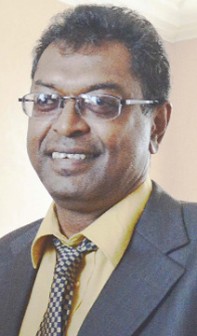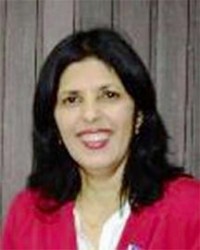Describing youth crime and violence as “two enemies of our people,” Public Security Minister Khemraj Ramjattan yesterday called on Caricom member states to join hands and make a committed effort to find remedies.
“We need to make a national and regional commitment to understand the causes of youth violence and crime, following which there needs to be a political commitment to procure the resources, train the brigade and to go get the recommendations implemented, to walk the talk,” he said at the opening ceremony of a two-day regional forum on youth and violence at the Arthur Chung Convention Centre, Liliendaal.
The forum, which is being attended by youth from across the Caribbean, is being held by the Caricom Secretariat under the theme ‘Youth Crime and Violence: breaking the cycle – exploring new platforms for transformation.’ It is open to the public.

Delivering his address, Ramjattan told an almost packed room that more can be learned if the region makes a long-term investment in national research of youth crime and violence; continues efforts at having a coherent and coordinated Caricom Regional Strategy for identifying the interventions needed; and institutes a programme of rigorously evaluating interventions to see what works and what doesn’t.
Ramjattan used the opportunity to defend his government’s gun amnesty programme, the enforcement of a 2 am curfew and the increase in gun licence fees, while saying that they all go towards stemming crime and violence. He said that funds must be found to treat with these issues and it is time to start prioritising the programming.

The one-time youth leader said that crime and violence “are substantially internally caused and rooted” and they persist despite scores of studies being done and lot of laws passed. “They still loom large, so large we sometimes want to surrender them,” he said.
Ramjattan highlighted some of the reports which examined youth crime and violence in the Caribbean from 2006 to present and noted that they highlighted the need for bonding between parents and children from birth, the roles of boys as well as talents not being purposefully directed.
Ramjattan noted that aggression at a young age “significantly predicts violent convictions later on.” He also said that most children who have been physically abused go one to live perfectly normal adult life, “yet we know physical abuse doubles the risk that a boy will have conviction for violent crime as an adult.” He also said that failures of a child at school is one of the most enduring correlations to later violence.
“Four out of five violent offenders in the Georgetown and prisons in and around Guyana, my prison director has estimated, never finished high school,” he informed, while adding that lack of parental supervision has also been consistently related to violent delinquency.
Noting that the question is what is to be done, Ramjattan told the gathering that though “we know plenty, we certainly do not know nearly enough as to how to prevent violence and youth crime in the first place or how to stop it happening.”
Not a simple task
Dr Manorma Soeknandan, Caricom’s Deputy Secretary-General, in her remarks, mentioned the increasing cases of violence appearing throughout the region. She said the region has not been silent on these issues and noted the report of the Caribbean Commission on Youth that was presented to heads of government in January 2010 and which recognised the seriousness of crime and violence and the need for concretive actions.
She added that the commission’s report identified crime and violence as the number one concern of youth and identified young people as under-utilised resources and partners in development. Dr Soeknandan said the report underscored the importance of addressing youth needs and interests to achieve social cohesion, economic resilience and integration.
Noting the region’s commitment to working together to address matters affecting youth, Ambassador Soeknandan said the Caricom Strategic Plan has laid out specific measures across a wide spectrum to ensure comprehensive treatment of crime and violence. She said that the implementation of this plan will be addressed through coordinated action among member states, the Caricom Secretariat and community institutions.
Soeknandan said that the forum theme spells out a challenge to break out of the “old modes of addressing these issues and to come up with new and innovative solutions.” She noted that one negative characteristic of the older initiatives was the lack of involvement of youth in developing and implementing solutions. She said that this does not mean “that the verdict should be shifted and put on the shoulders of the youth. The adult has a continuing role to play and must be held responsible and accountable.” She said too that today there is greater awareness that youth must be given a platform to share their views on youth violence and to address the component of an environment that would make them feel safe and secure and empowered to make positive choices. The forum, she stressed, sets the stage for this to be done.
“Addressing violence in any of its forms is not a simple task. It requires strong partnerships and approaches which are multi sectorial in nature,” she said before noting that policy makers, youth, educators, parents, researcher, protective services, the justice sector, private sector and civil society are all important actors.
She stressed to those gathered that each individual has a role to play in curbing youth crime and violence. “An all-inclusive approach is crucial,” she said and she added that at the level of government “we are yet to perfect the act of meaningful cooperation and coordinated action between and among ministries and departments to achieve effect solutions to development challenges that confront us. Violence is just one of these.”
She emphasised that those in high offices across the region must display a model behaviour that the youths can emulate.
The forum, she informed, will focus heavily on human development, which is a process that is largely built on the inter-relationships between and among people, opportunity and choices. She said that it is a process grounded on building an environment and opportunities for people to individually and collectively develop their full potential and have a reasonable chance at leading productive and creative lives.
She said that the task now is to spend every effort to challenge and overcome the economic and social disabilities, including crime and violence, that seek to hinder the full development of youth.
Value
Meanwhile, Dr Martin Baptise, Operations Officer (Education) at the Caribbean Development Bank (CDB), said there is no more urgent priority facing the region than to address the social imperatives that affect youth and children.
“We see value in investing in and supporting initiatives that address the issues that affect our young people and our children,” he added.
Baptise also said that the focus on breaking the cycle of crime and violence should see an equal focus on “having that cycle not started” and he highlighted the need to ensure that within education systems there is an experience of success in learning and school achievement in order for those who are vulnerable and at risk to be avoid going down the wrong path.
He spoke of the link between home and society and its importance in a framed context to how support can be given to young people and children. “We know that that effective second chance opportunities for education and training is important in ensuring that those who may, for whatever reason, not be able to maximise the opportunities, can in fact be given hope that beyond their initial attempts they can aspire and become the best that they can be,” he said.
Baptise also pointed out the importance of developing life skills. In 2000, he said, the Caribbean heads of governments, in response to looking at the issue of crime and violence, among other things, endorsed the health and family life education programme. He said that the region needs to ensure that this programme works “because it addressed many of the issues that emerge later one and we can start as early as the primary school.”
“We need to ensure that in classroom and in homes and in school and in society we do not have incubators of social deviants,” he charged while pressing on those participating in the forum to take initiatives that are tested and “bring them to scale.”
A video message from Spain’s Ambassador to Caricom, Jose Maria Fernandez Lopez de Turiso, who was unable to be at the forum, was shown. The Government of Spain has provided resources for a pilot project focused of reducing youth crime and youth violence in school and community. The project is being undertaken in five Caricom member states – Antigua and Barbuda, St Lucia, St Kitts and Nevis, Jamaica and Trinidad and Tobago.
Also present at the forum were Police Commissioner Seelall Persaud, ministers of government, and Chief Education Officer Olato Sam.





